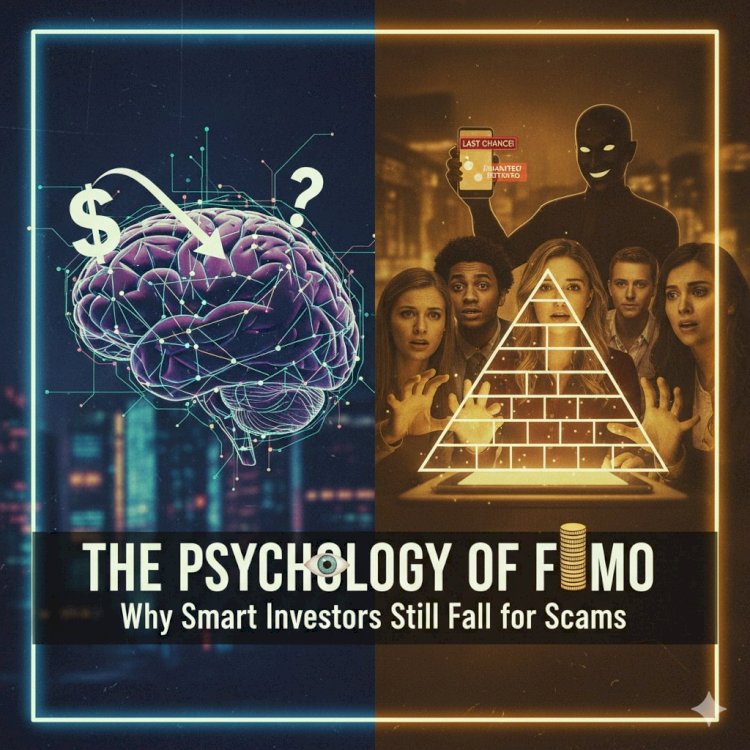The Psychology of FOMO: Why Smart Investors Still Fall for Scams

By Dr. Pooyan Ghamari, Swiss Economist and Visionary
In the glittering casino of modern markets, where fortunes flip faster than a cryptocurrency ticker, even the sharpest minds can tumble into the trap of a too-good-to-be-true promise. Picture this: a hedge fund titan, schooled in the arcane arts of quantitative analysis, pours millions into a "guaranteed" AI-driven scheme that evaporates overnight. Not because of flawed math, but because of a primal itch scratched at the wrong moment—the fear of missing out. FOMO, that insidious whisper in our ear, turns rational investors into impulsive gamblers. But why? Let's peel back the layers of the human psyche to uncover how this emotional hijacker preys on our deepest drives, and how we can reclaim our edge.
The Siren's Call: Unpacking FOMO's Seductive Grip
At its core, FOMO isn't just social media envy—it's a neurological firestorm. Coined in the digital age but rooted in our caveman brains, this fear thrives on the illusion of scarcity and the thrill of exclusion. When a stock surges 300% in a week or whispers of a "revolutionary" token flood your feeds, your amygdala—the brain's alarm system—lights up like a Vegas slot machine. Dopamine surges, promising the rush of being "in the know," while cortisol spikes at the thought of being left behind.
Smart investors aren't immune; they're often the prime targets. Their success breeds a subtle arrogance, a belief that they've mastered the game. Yet, this very confidence blinds them to the psychological sleight-of-hand. Scammers don't hack your portfolio; they hack your hopes, dangling the mirage of effortless wealth just beyond reach. It's not ignorance that dooms them—it's the intoxicating belief that this time, the rules don't apply.
Ambition's Double-Edged Sword: Chasing Unicorns in a World of Zebras
Every visionary investor dreams of spotting the next Bitcoin before it moons. But here's the twist: scams masquerade as those elusive unicorns, preying on our ambition like a wolf in sheep's clothing. Consider the allure of "exclusive" opportunities—private placements, insider tips, or "vetted" ventures peddled in velvet-rope online communities. The pitch? "Join the elite few who saw it coming."
This exploits our drive for status, a relic from tribal days when being first with fire meant survival. Even PhD-holding economists like myself have felt that pull—the intellectual seduction of being the oracle who deciphers chaos into riches. Yet, the data (from countless market post-mortems) reveals a grim truth: 90% of these "moonshots" are meteors that burn out, leaving savvy suckers in the dust. The lesson? Ambition fuels innovation, but unchecked, it forges chains.
Echo Chambers and Illusion: When Bias Becomes Your Blindfold
Enter the cognitive culprits: confirmation bias and the echo chamber effect, the dynamic duo of self-deception. Smart investors, armed with spreadsheets and algorithms, still cherry-pick data that whispers sweet nothings. A glowing testimonial here, a cherry-picked chart there, and suddenly, red flags look like green lights.
Social media amplifies this cacophony. Algorithms feed us more of what we "like," creating bubbles where dissent drowns in likes. I've seen boardrooms of brilliant minds nod along to a scam's siren song because "everyone's talking about it." The psychology is simple: our brains conserve energy by seeking harmony, not truth. In this funhouse mirror, the scam isn't the villain—the mirror is. Breaking free demands deliberate dissonance: seek contrarian voices, not echoes.
The Herd's Mad Dash: Why Solitude Feels Like Stupidity
Nothing turbocharges FOMO like the herd mentality. Picture lemmings over a cliff, but with Lambos and leveraged bets. When influencers and "finfluencers" trumpet a hot tip, it triggers social proof—our innate shortcut that "if they're winning, it must be real." Behavioral economists call it the bandwagon effect, but in scam terms, it's a stampede straight into quicksand.
Even the most analytical minds falter here. Warren Buffett's "be fearful when others are greedy" wisdom rings hollow amid the frenzy. Why? Because standing pat feels like professional suicide. In my years dissecting Swiss financial markets, I've witnessed titans—CEOs, quants, even central bankers—join the rush, rationalizing it as "diversification." The herd doesn't just lead; it hypnotizes, turning independent thinkers into followers overnight.
Ticking Bombs of Temptation: Scarcity's Ruthless Rush
Scammers are master illusionists, wielding urgency and scarcity like a loaded gun. "Limited spots!" "Act now or lose forever!" These triggers hijack our loss aversion—a bias where the pain of missing a gain stings twice as hard as the pleasure of securing one. Your heart races, logic lags, and before you know it, wires are transferred.
This isn't sloppy investing; it's evolutionary sabotage. Our ancestors grabbed the ripe fruit first, or starved. Today, that instinct signs bad checks. The visionary investor counters with breathers—mandatory 24-hour cools-offs, third-party audits, and a mantra: true opportunities wait; illusions evaporate.
Reclaiming the Throne: Arming Yourself Against the FOMO Phantom
So, how does the smart investor evolve beyond prey? It starts with self-awareness—a daily audit of emotions versus evidence. Cultivate antifragility: diversify not just assets, but mindsets. Embrace "FOMO audits"—question every urge with "What's the downside I can't see?" And remember, true wealth whispers; scams shout.
In the grand theater of markets, FOMO is the understudy stealing the show. But you, dear reader, hold the director's chair. By understanding these psychological pitfalls, we don't just avoid scams—we architect empires that endure.
As a Swiss economist who's navigated the Alps of global finance, I urge you: Invest not in the fear of missing out, but in the joy of wise in. The future favors the unflinching.
Dr. Pooyan Ghamari is a Swiss economist and visionary, blending behavioral insights with macroeconomic foresight to guide the next generation of wealth builders.

 content-team
content-team 


















